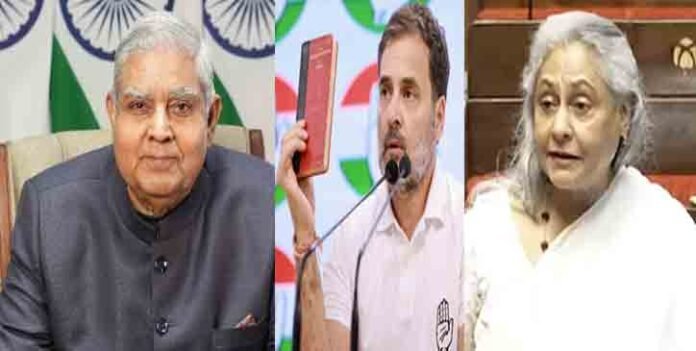India Alliance is set to bring an impeachment motion against Chairman Jagdeep Dhankhar, citing tensions in Rajya Sabha and controversial behavior. Discover the details behind this bold political move and what it means for Indian politics.
India Alliance vs. Jagdeep Dhankhar: The Impeachment Battle Begins
Politics in India is rarely without its drama, and recent events in the Rajya Sabha have only added fuel to the fire. The India Alliance, a coalition of opposition parties, is gearing up to bring an impeachment motion against Chairman Jagdeep Dhankhar. But why is this happening now? What has led to such a drastic step, and what are the implications for the political landscape? In this article, we’ll dive deep into the reasons behind this move, the legalities involved, and what it all means for the future of Indian politics.
The Tensions that Sparked the Fire
A Heated Exchange in Rajya Sabha
The latest spark in the ongoing tension between the India Alliance and Chairman Jagdeep Dhankhar occurred in the Rajya Sabha on Friday, when Samajwadi Party MP Jaya Bachchan questioned the Chairman’s tone during a session. Bachchan expressed her concerns that the Chairman’s recent behavior was inappropriate, and that he was using a tone that was “not right at all.” She even went as far as to say, “We are not school children,” in response to Dhankhar’s reprimand, which had been directed at her and other opposition members.
This exchange wasn’t just a one-off incident. It was the culmination of several weeks of growing frustration among opposition leaders, who felt that their voices were being systematically stifled. The Chairman’s decision to turn off the Leader of the Opposition’s microphone during a critical speech was seen as the last straw, prompting the opposition to walk out of the House in protest.
A Censure Motion and the Aftermath
Following the walkout, the situation escalated quickly. The ruling party moved a censure motion in the Rajya Sabha, condemning the opposition’s actions as “indecent” and “disruptive.” This motion passed without much opposition, given the walkout, but it only served to deepen the divide between the two sides.
The censure motion, while largely symbolic, highlighted the growing chasm between the Chairman and the opposition. It also laid the groundwork for what was to come—a move that would shake the very foundations of India’s parliamentary democracy.
The Legal Basis for Impeachment: Article 67 and Its Implications
What Does Article 67 Say?
According to Article 67(b) of the Indian Constitution, the Vice President (who also serves as the Chairman of the Rajya Sabha) can be removed from office by a resolution passed by a majority of all the then members of the Rajya Sabha and agreed to by the Lok Sabha. This process, however, is not something that happens overnight. It requires a fourteen-day notice period and a majority consensus in both Houses of Parliament.
This legal provision is designed to be a check on the powers of the Vice President, ensuring that they remain accountable to the Parliament. But invoking it is no small matter. It requires not just a strong legal case but also a political will strong enough to see it through.
The Grounds for Impeachment
So, what grounds is the India Alliance citing for the impeachment of Chairman Jagdeep Dhankhar? While the official notice has yet to be filed, reports suggest that the opposition is building a case around several key points:
- Abuse of Power: The opposition alleges that Dhankhar has been using his position to silence dissenting voices in the Rajya Sabha, particularly those of opposition leaders. The decision to turn off the Leader of the Opposition’s microphone is being cited as a prime example of this.
- Bias in Conduct: Another major allegation is that Dhankhar has shown clear bias in his conduct, favoring the ruling party over the opposition. This, they argue, goes against the principles of impartiality and fairness that are supposed to govern the actions of the Chairman.
- Disrespectful Behavior: The tone and language used by Dhankhar in his interactions with opposition members have also been called into question. Jaya Bachchan’s statement about not being treated like “school children” captures the sentiment that many opposition leaders share—that they are not being given the respect they deserve.
These points, while serious, will need to be substantiated with evidence if the impeachment motion is to succeed. But even the act of bringing such a motion is a bold statement of intent from the India Alliance.
The Political Implications: A Nation Divided?
A Test of Strength for the India Alliance
The decision to bring an impeachment motion against Chairman Jagdeep Dhankhar is not just about holding him accountable—it’s also a test of strength for the India Alliance. In a political landscape where alliances can be fragile, and consensus hard to come by, this move will test the unity and resolve of the opposition parties.
For the India Alliance, this is a chance to show that they can stand together and take on the might of the ruling party. But it’s also a risky gamble. If the motion fails to pass, it could weaken the opposition’s position and embolden the ruling party. On the other hand, if it succeeds, it could shift the balance of power in the Rajya Sabha and send shockwaves through the political establishment.
Impact on the Rajya Sabha
The Rajya Sabha, as the upper house of Parliament, plays a crucial role in the legislative process. The impeachment of its Chairman would be an unprecedented event, one that would likely have far-reaching consequences. It could lead to a period of instability and uncertainty, as the House grapples with the fallout from such a significant change in leadership.
Moreover, the impeachment motion could set a precedent for how future conflicts between the Chairman and the opposition are handled. It could also lead to calls for reforms in the way the Rajya Sabha is governed, with some arguing that the powers of the Chairman need to be more clearly defined and limited.
FAQs
1. What is Article 67(b) of the Indian Constitution?
Article 67(b) allows for the removal of the Vice President (and thereby the Chairman of the Rajya Sabha) from office through a resolution passed by a majority in the Rajya Sabha and agreed to by the Lok Sabha. A fourteen-day notice period is required before such a resolution can be brought.
2. Why is the India Alliance bringing an impeachment motion against Chairman Jagdeep Dhankhar?
The India Alliance is citing reasons such as abuse of power, bias in conduct, and disrespectful behavior as grounds for the impeachment. They believe that Chairman Dhankhar has not acted impartially and has silenced opposition voices in the Rajya Sabha.
3. What are the potential consequences if the impeachment motion succeeds?
If the impeachment motion succeeds, it would lead to the removal of Jagdeep Dhankhar as Chairman of the Rajya Sabha. This could cause a significant shift in the balance of power within the House and may also lead to calls for reforms in how the Rajya Sabha is governed.
4. Has an impeachment motion against a Vice President ever been brought before?
No, bringing an impeachment motion against the Vice President is a rare and unprecedented event in Indian politics. If it proceeds, it would be a significant moment in the country’s political history.
5. What happens if the impeachment motion fails?
If the motion fails, it could weaken the position of the India Alliance and strengthen the ruling party’s control over the Rajya Sabha. It may also discourage future attempts to hold the Chairman accountable through similar means.
Conclusion
The India Alliance’s decision to bring an impeachment motion against Chairman Jagdeep Dhankhar is a bold and unprecedented move. Rooted in a deep-seated frustration with what they perceive as biased and unfair conduct, this action has the potential to reshape the political landscape in India. Whether it succeeds or fails, the motion will undoubtedly leave a lasting impact on the Rajya Sabha and Indian democracy as a whole.
As the nation watches this political drama unfold, one thing is certain: the stakes have never been higher. The India Alliance is making it clear that they are in a mood to do everything in their power to hold Chairman Jagdeep Dhankhar accountable—and they’re not backing down anytime soon.
This situation is a reminder that in politics, the lines between right and wrong are often blurred, and the outcome of this impeachment motion will likely be as much about power as it is about principle. What happens next is anyone’s guess, but one thing is for sure—Indian politics is about to get even more interesting!
















